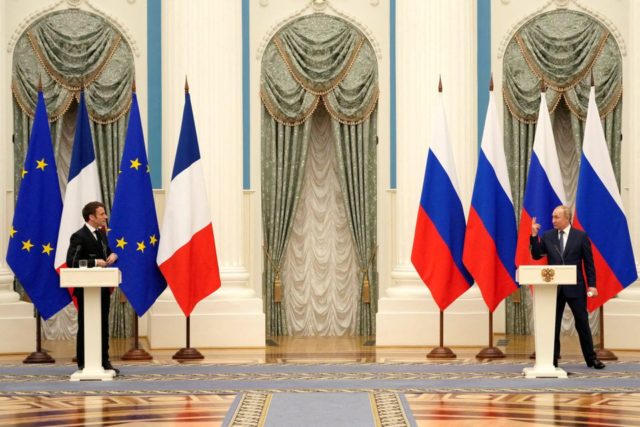
Macron’s Ukraine Diplomacy Runs Into a Kremlin Wall
Publication: Eurasia Daily Monitor Volume: 19 Issue: 17
By:

French President Emmanuel Macron held talks with Russian President Vladimir Putin in Moscow and Ukrainian President Volodymyr Zelenskyy in Kyiv on February 7 and 8, respectively. Overshadowing the talks were Russian forces staging a war scare near Ukraine’s borders.
Macron is attempting a solo act, or end run, as mediator, bypassing the quadripartite “Normandy” format (Ukraine, Russia, France, Germany). Following former German chancellor Angela Merkel’s retirement, the stage seems free for this French president at long last to upstage Germany, at least momentarily. Although the next Normandy summit would be held (if at all) in Berlin, Macron displays the ambition to bring that summit about by himself.
The moment is also defined by Macron’s six-month term in the rotating presidency of the European Union. Although he has no EU mandate to mediate between Russia and Ukraine (neither do Germany and France in the Normandy format), Macron sees a unique—and fleeting—opportunity to leverage the EU presidency position in support of his mediator’s role.
Equally if not more so, Macron’s initiative is timed to his reelection effort. The presidential election is due in April, Macron’s poll ratings are precarious, and his main challengers—the national-conservatives Éric Zemmour and Marine Le Pen—are overt Russia-sympathizers. Macron has said that he would officially declare his candidacy after achieving a significant result in some (any) policy area.
Courting Putin to avert an invasion of Ukraine, at the cost of forcing Ukrainian compliance with the Minsk “agreements,” is Macron’s chance for a quick pre-election success and to appear as a European leader at the same time. In the latter role, he telephoned several European leaders and (twice) United States President Joseph Biden in the run-up to his Moscow visit (Elysée.fr, February 6).
Moscow is not playing off Zemmour and Le Pen against Macron. On the contrary, the Kremlin allows Macron to capitalize electorally on his relationship with Putin. The Kremlin would readily give Macron his diplomatic “breakthrough” on Ukraine, but only on Russia’s own terms, as Putin insisted in the five-hour talks with Macron in Moscow.
The concluding joint briefing showed Macron echoing Russia’s lines: “The Ukrainian question [sic] can only be resolved politically on the basis of the Minsk agreements.” The Normandy format shall “continue efforts for the full implementation of the Minsk agreements, fully and precisely.” Macron admitted that Ukraine’s constitutional reform, special status for the Donetsk-Luhansk territory, and elections there, “all currently under consideration, are very sensitive issues, and they will be disputed” by Ukraine. “It is the Minsk agreements that can really resolve the Ukrainian crisis [sic], this is what I will tell President Zelenskyy tomorrow” (Elysée.fr, February 7).
Pleading for de-escalation of Russia’s military buildup near Ukraine (“this is neither in Russia’s nor in Europe’s interests,” he advised), Macron implicitly but clearly held out Ukrainian political concessions in exchange for Russian military de-escalation (Agence France Presse, February 7, 8).
Putin, for his part, merely repeated the standard lines about Ukraine’s “obligations” to carry out the Minsk “agreements” as written and to negotiate directly with the Donetsk and Luhansk authorities. On this occasion, however, the Kremlin leader felt free to add a morbid insult to Ukraine in the context of her “obligations.” Smirking, he quoted from the song of a Russian punk band: “Whether you like it or not, just bear the suffering, you pretty girl.” That band’s repertoire is known for catering to sadism and necrophilia (TASS, Argumenty i Fakty, February 8).
In Kyiv, Macron delivered the diplomatic message as promised on Putin’s behalf and his own: “The Minsk agreements are the only way to peace, the only one,” he told President Zelenskyy in their joint news conference. “As I told president Putin yesterday, [peace is] strictly based on the Minsk agreements” (Ukrinform, February 8).
Macron attempted to pin down Zelenskyy publicly into an untenable position, imputing these words to him: “Ukraine has confirmed that it is ready to move forward with these (Minsk) agreements. President Putin in our discussion yesterday confirmed his intention to continue adhering to the Minsk agreements. And today, I heard from you that you are also ready to carry out these agreements” (Ukrinform, February 8).
This was almost certainly Macron’s report card to Putin, but it did not work out. Kremlin spokesperson Dmitry Peskov dismissed it: “We did not hear any words from President Zelenskyy that he is prepared to start fulfilling Kyiv’s commitments any time soon, no such words” (TASS, February 9).
Macron’s assurance to Zelenskyy that Putin is committed to the Minsk documents seems highly redundant, but it is not. It should be read as implying that Putin would prefer to implement this solution with Ukraine’s consent, instead of having to enforce it by invading Ukraine.
That implication, apparently, prompted Zelenskyy’s retort that he expects from Putin not words but deeds, starting with military de-escalation at Ukraine’s borders. The Ukrainian president, however, weakened his hand by pining for a Normandy summit, which he is known to value for the opportunity to meet with Putin bilaterally. Such a summit may have to be paid for through political concessions to Russia, as was the case the last time, in December 2019 (see EDM, December 5, 9, 2019 and January 16, 2020).
On the airplane en route to Moscow, Macron confided to French journalists that “Finlandizing” Ukraine could solve two problems: the conflict between Russia and Ukraine, and the relations between Russia and the North Atlantic Treaty Organization (NATO). “Finlandization” of Ukraine would provide Russia with the “guarantee” it wants against NATO’s enlargement and would enable “NATO to cohabit with Russia in Europe.” He would put this issue, among others, on Putin’s table, Macron told the accompanying French journalists” (Le Figaro, Le Monde, February 7, 8). In Kyiv, Macron denied having said that, and Ukrainian officials contended that he did not bring this proposal or opinion to Kyiv.



